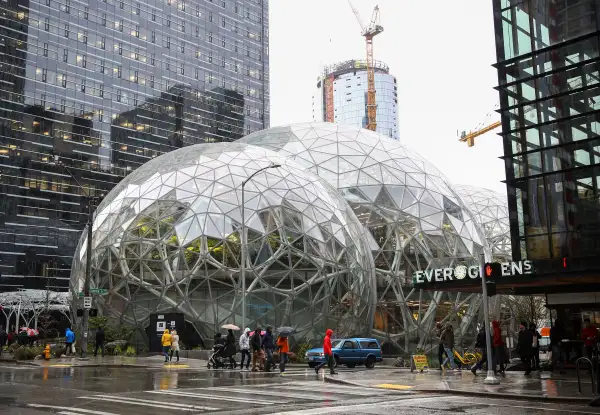This Is What Amazon Is Really Looking For in Its New 'HQ2' Headquarters

Cities may have uncovered the key to success in Amazon's top-secret process for choosing the location of its "HQ2" second headquarters. Bloomberg BNA reported Monday that, in narrowing the applicant pool from 238 to 20, the company disqualified candidates that didn't have a large tech workforce nearby.
"Companies like Amazon, Facebook, Google and Apple are unique in that talent dwarfs everything else," said Calandra Cruickshank, founder and CEO of StateBook International, an online marketplace that compiles information for companies looking to expand, told Bloomberg. "Workforce is the number one factor driving site selection decisions today."
Because HQ2 is expected to create as many as 50,000 jobs at its new $5 billion facility, Amazon needs its winning city to produce a sizable staff. It noted in its request for proposals that HQ2's eventual location "must be sufficiently close to a significant population center" as well as have a "highly educated labor pool" and "strong university system." The company didn't return Money's request for further details.
Cities that made Amazon's top 20 include Boston, Chicago, New York City and the Washington D.C. metro area. The short list left off places like Los Angeles, Las Vegas and Detroit — some of which have publicly blamed a talent shortage for their downfall.
"At the end of the day, their feedback was that talent was the most important factor out of everything they looked at,'' said Ed Loyd, a spokesman for the group that put together Cincinnati's failed bid for HQ2, this past January.
Sandy Baruah, the president and chief executive officer of the Detroit Regional Chamber, told the Detroit Free Press that Amazon gave him a similar explanation.
"Since our renaissance is relatively new here, I think it's difficult for Amazon to make the size of the bet they're about to make on HQ2 in a place with a track record on talent that is good but not necessarily long enough," he added.
Nearly all of the regions on Amazon's top 20 were also found by the Brookings Institution to be in the top 20 metropolitan areas with the biggest recent increase in tech jobs. Among them is rumored front-runner Washington, D.C., where Amazon founder Jeff Bezos is converting a 27,000-square-foot former museum into a house.
But even the losers may end up winners eventually. Holly Sullivan, Amazon's head of worldwide economic development, released a statement earlier this year telling the overlooked locations that, now that Amazon has learned all about them, the communities could be picked for future projects.
